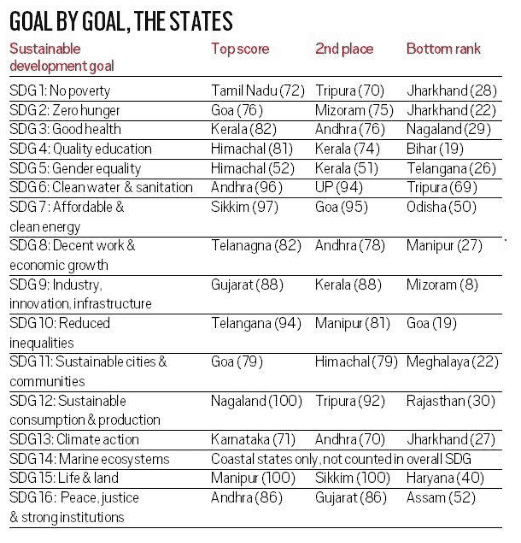All India Radio, UPSC Articles
Launch of Sustainable Development Goals Index
Search 30th Dec, 2019 Spotlight here: http://www.newsonair.com/Main_Audio_Bulletins_Search.aspx
TOPIC: General Studies 2:
- Important aspects of governance, transparency and accountability, e governance- applications, models, successes, limitations, and potential; citizens charters, transparency & accountability and institutional and other measures
Context:
- The NITI Aayog recently released the Baseline Report of the Sustainable Development Goals (SDG) India Index, which comprehensively documents the progress made by India’s States and Union Territories towards implementing the 2030 SDG targets.
- The SDG India Index was developed in collaboration with the Ministry of Statistics & Programme Implementation (MoSPI), Global Green Growth Institute and United Nations in India.
Background:
The Sustainable Development Goals (SDGs) were adopted in September 2015 as a part of the resolution, ‘Transforming our world: the 2030 Agenda for Sustainable Development’. India is committed to achieve the 17 SDGs and the 169 associated targets, which comprehensively cover social, economic and environmental dimensions of development and focus on ending poverty in all its forms and dimensions. At the Central Government level, NITI Aayog has been assigned the role of overseeing the implementation of SDGs in the country.
Sabka Saath, Sabka Vikas
NITI Aayog has the twin mandate to oversee the implementation of SDGs in the country, and also promote Competitive and Cooperative Federalism among States and UTs.
The SDG India Index acts as a bridge between these mandates, aligning the SDGs with the Prime Minister’s clarion call of Sabka Saath, Sabka Vikas, which embodies the five Ps of the global SDG movement – people, planet, prosperity, partnership and peace.
- The SDGs are ambitious global development goals that address key aspects of universal wellbeing across different socio-economic, cultural, geographical divisions and integrate the economic, social and environmental dimensions of development.
- India’s progress in SDGs is crucial for the world as the country is home to about 17% of the world population.
- The SDG India Index tracks progress of all States and UTs on 62 Priority Indicators selected by NITI Aayog, which in turn is guided by MoSPI’s National Indicator Framework comprising 306 indicators and based on multiple-round consultations with Union Ministries/Departments and States/UTs.
- The SDG India Index will also help highlight crucial gaps related to tracking SDGs and the need for India to develop its statistical systems at National & State/UT levels. This shall lead to the index evolving and becoming more comprehensive over the coming years.
- The indicators shall be further refined and additional indicators will be added with improvement in data collection, reporting processes & methodology.
- NITI Aayog is also exploring potential for disaggregating data and developing capacity for real time monitoring and measuring incremental progress.
Working:
- A composite score was computed between the range of 0-100 for each State and UT based on their aggregate performance across 13 SDGs, which indicates average performance of State/UT towards achieving 13 SDGs & their respective targets.
- If a State/UT achieves a score of 100, it signifies that it has achieved the 2030 national targets. The higher the score of a State/UT, the greater the distance to target achieved.
| OVERALL | Aspirant (0-49) | Assam, Bihar and Uttar Pradesh |
| Performer
(50-64) |
Andhra Pradesh, Arunachal Pradesh, Chhattisgarh, Goa, Gujarat, Haryana, Jammu & Kashmir, Jharkhand, Karnataka, Madhya Pradesh, Maharashtra, Manipur, Meghalaya, Mizoram, Nagaland, Odisha, Punjab, Rajasthan, Sikkim, Telangana, Tripura, Uttarakhand, West Bengal, Andaman & Nicobar Islands, Dadra & Nagar Haveli, Daman & Diu, Delhi and Lakshadweep |
|
| Front Runner
(65-99) |
Himachal Pradesh, Kerala, Tamil Nadu, Chandigarh and Puducherry | |
| Achiever (100) | NA |

All India Radio (AIR) IAS UPSC – Launch of Sustainable Development Goals Index
Source: https://images.indianexpress.com/2019/12/sdg-goal.jpg
Connecting the Dots:
- The attainment of Sustainable Development Goals (SDGs) require active participation of the panchayati raj institutions (PRIs). Do you agree? Substantiate.














